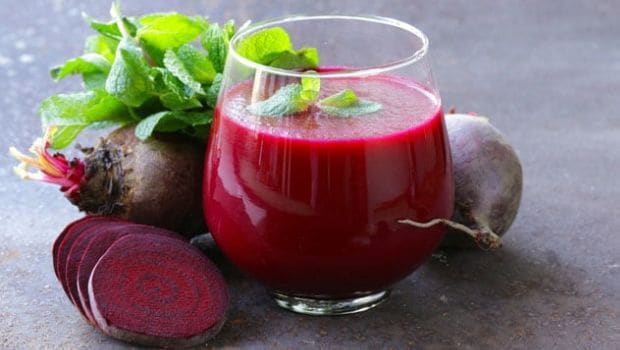No. Beetroot Juice Consumption May Help Improve Cardiovascular and Cognitive Health
Science News Staff / Source
Drinking beetroot juice, which is rich in inorganic nitrate, promotes communities of oral bacteria associated with healthier blood vessels and brain function, according to new research led by the University of Exeter.
Aging is hallmarked by reduced
nitric oxide production with associated detriments to cardiovascular and
cognitive function.
“We are really excited about our
findings, which have important implications for healthy aging,” said Professor Anni Vanhatalo, a researcher at the College of Life
and Environmental Sciences at the University of Exeter.
“Previous studies have compared the oral bacteria of young and older people, and healthy people compared to those with diseases, but ours is the first to test nitrate-rich diet in this way.”
“Our findings suggest that adding
nitrate-rich foods to the diet — in this case via beetroot juice — for just ten
days can substantially alter the oral microbiome for the better.”
In the study, Professor Vanhatalo
and her colleagues from the University of Exeter, Cardiff University and the
University of Stavanger surveyed the oral bacterial communities in saliva
samples of 30 older people following 10 days of dietary inorganic nitrate
(nitrate-rich beetroot juice) and placebo (nitrate-free beetroot juice)
supplementation.
The results showed higher levels of
bacteria associated with good vascular and cognitive health, and lower levels
of bacteria linked to disease and inflammation.
“Relative abundances of
Proteobacteria increased, while Bacteroidetes, Firmicutes and Fusobacteria
decreased after nitrate supplementation,” the researchers said.
“Two distinct microbiome modules of
co-occurring bacteria, that were sensitive to nitrate supplementation, showed
stable relationships with cardiovascular (Rothia-Streptococcus) and cognitive
(Neisseria-Haemophilus) indices of health across both dietary conditions.”
“A microbiome module
(Prevotella-Veillonella) that has been associated with pro-inflammatory
metabolism was diminished after nitrate supplementation, including a decrease
in relative abundance of pathogenic Clostridium difficile.”
Systolic blood pressure dropped in
participants on average by five points (mmHg) after drinking the beetroot
juice.
“More research is needed to confirm
the findings and see whether similar effects are found in other groups,”
Professor Vanhatalo said.
“Our participants were healthy,
active older people with generally good blood pressure.”
“Dietary nitrate reduced their blood
pressure on average, and we are keen to find out whether the same would happen
in other age groups and among people in poorer health.”
The results were published in the journal Redox Biology.
_____
Anni Vanhatalo et al.
2021. Network analysis of nitrate-sensitive oral microbiome reveals interactions
with cognitive function and cardiovascular health across dietary
interventions. Redox Biology 41: 101933; doi:
10.1016/j.redox.2021.101933
